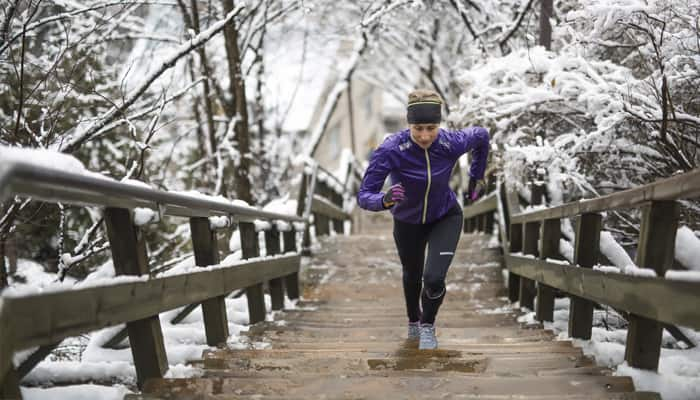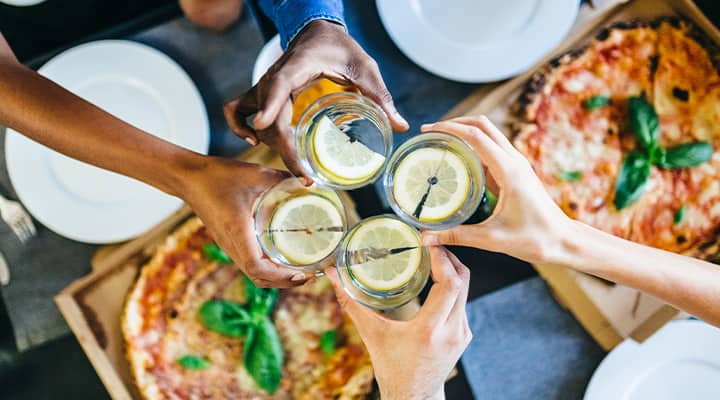
12 Ways to Boost Your Energy in Winter
Published: November 2020
Cold air, snow, icy roads, gray skies…doesn’t this make you want to drive to the gym or go for a run outside? Probably not!
During the winter months, it can be more difficult to get yourself up and going when you’re snug underneath a blanket, warding off the elements.
This, combined with the onslaught of scrumptious holiday temptations, can be a recipe for weight gain and lethargy.
Not to fear, though. Here are 12 tips to boost your energy naturally and help keep your body from falling into a metabolic rut this winter.

1. Eat breakfast.
You might be tempted to stay curled up under the covers with only a warm cup of coffee or hot chocolate, but make the effort to get out of bed and eat a good meal. A healthy, hearty breakfast helps you stay energized and focused throughout the day. People who don’t eat breakfast tend to be less active throughout the day than those who do.
2. Stay hydated.
Of course, water is necessary for all of life’s functions… in addition, staying hydrated is also important for protecting your muscle-building proteins from being broken down—and, instead, burning fat for energy.

3. Exercise—at least a little.
Short bursts of intense exercise can rev your ability to burn more calories post-workout more than long, easy sessions. Also, muscle itself increases your metabolic rate, so add in some strength training, as well. Don't have access to a gym or weights? Try using canned soups, water or milk jugs, suitcases, bags of flour or sugar, socks…and even kids! Be creative.
4. Be smart about snacks.
Consuming healthy snacks, such as fresh fruits and nuts, makes it easier to say no to the cookies calling your name when you get hungry. Keep your portions moderate, though, to avoid overdoing your calorie intake.
5. Spice it up.
Adding some kick to your meals could improve your metabolic health, too. So, go ahead and add the chilis and sprinkle on the red pepper flakes!

6. Eat enough protein.
Replacing some of your fat or carbohydrate-rich meals or snacks with a higher-protein option can help support your muscles. As an added benefit, digesting protein may burn more calories than fat and carbohydrates. Opt for lean proteins like chicken, tuna, egg whites, etc.
7. Pop a probiotic.
Probiotics help support healthy energy production as well as those good bacteria in your gut. Research shows probiotics can also support your immune system and help you manage stress and elevate your mood, all important considerations during the winter holidays and beyond.
8. Get energy in vitamin form.
Energy comes from the foods we eat. That means you can boost your energy with the right vitamins, minerals and nutrients, such as a vitamin B complex, which affects enzymes critical to healthy metabolic processes. And ingredients such as CoQ10, resveratrol and PQQ help fuel your body at the cellular level.

9. Reach for the roast.
Coffee has been shown to provide many health benefits when consumed in moderation. This is partially due to its caffeine content, which can help improve exercise performance, as well as equip you with the energy and focus you need to have an effective exercise session.
10. Keep it cold.
A small clinical study suggested that keeping your bedroom cooler while you sleep can increase your proportion of brown adipose tissue, a type of fat that functions more like muscle, helping to burn calories.
11. Get enough sleep.
Speaking of the bedroom, getting enough sleep is a great way to increase your energy level. Shorter sleep durations are also associated with unhealthy food choices and increased risk of overeating.
12. Keep smiling.
When you're stressed, you produce higher levels of the hormone cortisol—which could contribute to the overeating that is so common when you feel stressed out. Smiling can help keep stress levels lower for you and those around you!
It’s perfectly fine to have those lazy moments and enjoy cuddling up with a good book every once in a while, but implementing these energy and metabolism tips into your daily routine can help you avoid a winter slump.
References:
- Proc Nutr Soc. 2016;75(3):319-27.
- Eur J Clin Nutr.2003;57 Suppl 2:S69-74.
- Endocr Rev. 2018;39(4):489-517.
- J Agric Food Chem. 2018;66(33):8662-8671.
- Nutrients. 2018 Feb 7;10(2):180
- Nutrition & Dietetics. 2008;65(4):246-252.
- J Sport Health Sci. 2017;6(2):179-197.
- Curr Opin Gastroenterol. 2015;31(2):153-8.
- JAAPA. 2018;31(5):1-3.
- Nutrients. 2016;8(2):68.
- Curr Drug Metab. 2016;17(4):345-58.
- Nutrients. 2019 Jan 6;11(1):105
- J Nutr Biochem. 2013;24(12):2076-84.
- Eur J Nutr. 2020 Jun;59(4):1529-1539
- PLoS One. 2013;8(4):e59561.
- Diabetes. 2014;63(11):3686-98.
- Sleep Health. 2020;6(1):88-91.
- Psychoneuroendocrinology. 2001;26(1):37-49.
- Annu Rev Psychol. 2019;70:703-718.
- Psychol Sci. 2012;23(11):1372-8.
- "How to Boost Your Metabolism With Exercise." WebMD, June 2019, https://www.webmd.com/fitness-exercise/guide/how-to-boost-your-metabolism
- Batterham, Marijka, et al. "High‐protein meals may benefit fat oxidation and energy expenditure in individuals with higher body fat." Nutrition & Dietetics, December 2008, https://www.researchgate.net/publication/227653868_High-protein_meals_may_benefit_fat_oxidation_and_energy_expenditure_in_individuals_with_higher_body_fat
- Clayton, David J. "The effect of breakfast on appetite regulation, energy balance and exercise performance." Cambridge University Press, December 2015, https://www.cambridge.org/core/journals/proceedings-of-the-nutrition-society/article/effect-of-breakfast-on-appetite-regulation-energy-balance-and-exercise-performance/7DE3915D5A4D951FEC7FC861448245E6
- Pacheco, Danielle. "How to Sleep When it’s Hot Outside." Sleep Foundation, October 2020, https://www.sleepfoundation.org/bedroom-environment/sleeping-when-its-blistering-hot
- Pacheco, Danielle. "Sleep Satisfaction & Energy Levels." Sleep Foundation, January 2021, https://www.sleepfoundation.org/sleep-hygiene/sleep-satisfaction-and-energy-levels
- Waldegger, S et al. "Effect of cellular hydration on protein metabolism." Miner Electrolyte Metab., 1997, https://pubmed.ncbi.nlm.nih.gov/9387117/
Always be in the know!
Access the latest deals, wellness news, expert health tips & more!



